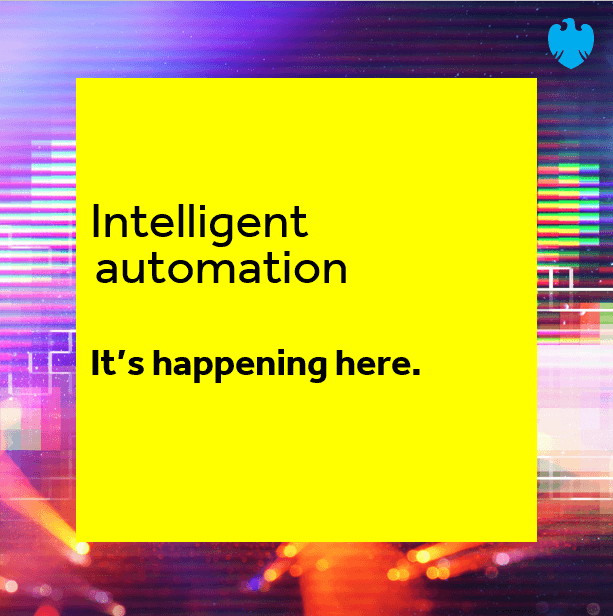
Sundar Ganesh was one of the very first members of our 11,000-strong tech team in India. He can probably also claim to be the most successful recruiter in Barclays’s history. There are currently nearly 1,400 digital workers across Barclays who owe their roles to Sundar and his team. And they are a pretty impressive bunch.
They work in practically every aspect of the Group’s operations. They manage 7.4 million transactions a year. They have a 90% success rate. They’ve delivered benefits worth millions. And they never take holidays or sick days. Though they do have to be careful around viruses.
They are digital colleagues, the bots, workflows and algorithms that play a leading role in the intelligent automation solutions developed by Sundar’s team – the Process Automation Centre of Excellence (PACE).
Automation comes in all shapes and sizes across Barclays. Digital colleagues help our Customer Service Agents to find information and handle customer queries faster. They flag transactions for possible fraud. They help merchants to set up their accounts. They repair customer errors that occur across the hundreds of thousands of CHAPS payments we manage every day. All that work starts with PACE.
Process automation is an approach that brings together a range of technologies to map, optimise and automate complex interrelated processes by breaking them down into repetitive tasks, like an assembly line.
At PACE, that includes: machine learning; Natural Language Processing (NLP); intelligent automation, process design and mining; intelligent business process management systems; robotic process automation; intelligent document processing; data management and analytics; cognitive automation.
Process automation is a way of thinking about things. It’s a mindset that is constantly trying to optimise and streamline business processes to deliver better outcomes. And it’s the practical tools and techniques you use to automate those processes in an intelligent way
Of course, when you start looking at overall processes in that way, you have to start thinking about how technology and people work together. That’s the burgeoning new field of Intelligent Automation.
“The random factor in complex business processes is almost always the human element. So you have to empathise with the user. You have to think about the things humans do. The way they see, touch, think and speak. And you have to think what parts of those processes can be optimised and automated too.”
Using automation intelligently is not just about cutting the time and cost it takes to do things. It’s about delivering the tools and technology to support our human capacity to meet customer needs, while elevating the quality of work and employee experience for our colleagues.
“We’re always asking the same questions. Is this automation going to service customers better? Will it unlock time for our people to do more valuable work? Are we reducing error rates? Are we improving the controls? Can it open up new opportunities?”
The Barclays Customer Home Assistance team does vital work with customers in financial distress. The team has over 100 colleagues servicing more than 70,000 customers every year, through inbound and outbound support channels. Unfortunately, the customer’s key credentials are spread across multiple applications and retrieving their details is manual and time-consuming process. The advisor has to toggle between applications and screens to fetch customer information. All this complexity stands in the way of our colleagues doing what they do best. They need to focus on engaging and empathizing with customers to understand their issues, in order to suggest possible options on their mortgage.
PACE helped the team to implement UiPath attended automation to act as a virtual assistant and eliminate those manual toggles and clicks. Now a digital colleague fetches the information from the different applications and presents it to the advisor on a single screen, which they can refer to throughout a call.
The solution made life much easier for advisors, empowering them to deliver a better customer experience. It also cut the average length of their customer interactions, meaning that more people were being helped faster. Meanwhile, PACE was able to optimise the process and enhance controls by embedding a standardised approach to documentation after a customer contact.
PACE also partners with teams to drive revenue. One of Barclays’ trading desks in Hong Kong had a very manual system for pricing trades. When a client wanted to make a trade, the sales desk had to request a price for the product, a colleague would search for the price, then the sales team would get that price agreed and book the trade.
PACE was able to streamline the process massively. Now when our teams engage with clients using specific syntaxes, the chatbot recognises the key phrases, finds the live price and shares it with the sales desk automatically.
As a centre of excellence, we work in close partnership with practically every part of the Group. And our reach is growing year on year
It’s the partnership approach that makes a big difference. “You can’t make real change at arm’s length. Each business unit has a dedicated PACE team helping them to develop and deliver their own automation strategy.”
It’s also more rewarding for Sundar’s team. “We have a very flat structure. 65% of my team are engineers, the rest are solutions people who consult with our internal clients on the art of the possible. Our most important skill is understanding our colleagues’ challenges.”
PACE teams work hard to understand the way business units approach tasks and connect to technology. “They build relationships. They build partnerships. They understand applications and process. The make sure that automation feels part of the business unit’s capability – not a bolt on.”
The first step to any project is understanding what the business process is, and what it takes for the team to execute it. Then you try to understand the interaction of human to technology that currently exists.
Next, PACE partner with transformation teams to identify any opportunities to optimise that process before automating it. There’s no point just automating a process as it is, if you’re missing out on an opportunity to make it better, faster, safer or more secure.
Then you look for ways to break down the process into chunks and see which applications can help to execute each part. You are always trying to make the process more intelligent, less intrusive and fast as possible.
Meanwhile, PACE supports an ever-evolving business serving an ever-changing world. “Seemingly unrelated changes to regulations, our business, or our customers’ needs, can impact the processes we’re automating and the technologies we’re using to automate them,” explains Sundar.
Fundamentally, that’s why it’s important to think of the bots, workflow and algorithms that drive our intelligent automation solutions as digital colleagues. Each digital colleague has an employee ID. Their own desktop. Their own individual access rights.
“We’re not just deploying code. We’re supplying digital team members to our operations teams. So you’ve got to manage them like other employees. Update them when things change. Support them to deliver their processes. Manage and monitor their performance,” says Sundar.
As businesses think more about automation, it’s fundamentally changing the way that they monitor their processes. “It’s a really interesting space. We’re using the very latest tools to trace the digital footprint of our processes front to back across the organisation. And it’s amazing what you find. We looked at the procurement process, which you might think would be relatively standardised and straightforward, yet we found that there were thousands of variations in the way those processes worked.”
It’s another example of how Sundar’s award-winning team is leading the industry.
“It’s very exciting for our people. The PACE model gives them the opportunity to come up with new solutions and then build and execute them. We are really pushing the boundaries on machine learning. We have all the tools we need and huge support across Barclays.”
It's also a great example of the quality of Barclays’ tech teams in India. PACE supports the business all over the world, but the centre of excellence runs entirely out of India.
The future of business will be all about how humans and digital colleagues work together seamlessly. So we feel like we’re making a real difference.


